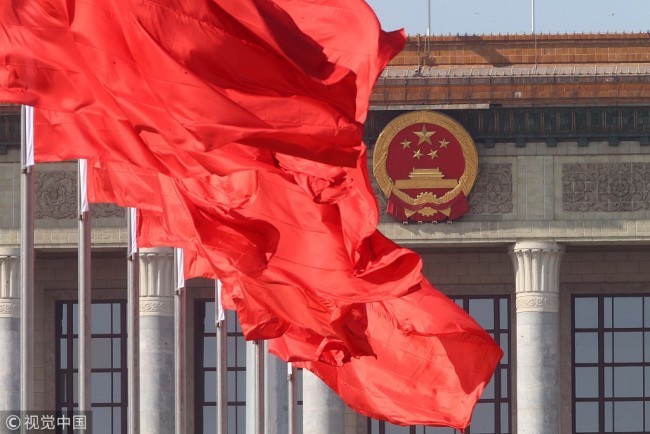People's congress system propels common development

[Photo/VCG]
The year 2020 saw China make the greatest development achievement in human history by eradicating extreme poverty from the country — and realizing one of the most important goals of the United Nations 2030 Agenda for Sustainable Development 10 years before schedule. And it is marching toward the goal of building China into a great modern socialist country that is prosperous, strong, democratic, culturally advanced, harmonious, and beautiful from 2035 through the middle of this century. To what does China owe this great and inspirational achievement?
A story from People's Daily provides insight into a heartwarming incident. At the beginning of 2023, the first secretary of Baigou village in Henan province, made multiple visits to a villager's family who had tragically lost their only son to illness. The family's plight was discussed by the village committee and representatives: they had lost their sole source of income, the elderly couple was grappling with hypertension and diabetes, and the granddaughter still needed support for her education.
Following a process of democratic evaluation and discussion, the assembled representatives unanimously agreed to include this family in dynamic monitoring and management. They facilitated the elderly couple in obtaining chronic disease cards and assisted the granddaughter in securing financial aid for impoverished students. Thanks to these interventions, the rural family managed to avoid falling back into poverty and gradually returned to a semblance of normalcy.
This vivid example illustrates how grassroots democracy significantly improves people's livelihoods.
China launched reform and opening-up in the late 1970s to overcome the contradictions, ushering in trade liberalization and promoting market-oriented economic development while adhering to socialist principles. In the past more than four decades, reform and opening-up, which includes governance reform and improving the people's congress system, enabled China to transform from a poor, agrarian society to the world's second-largest economy, lifting about 800 million people out of poverty, and raising its share in the global economy from 1.8 percent to 15 percent. By the end of 2023, China's primary medical and old-age insurance plan covered about 1.34 billion people and more than 1 billion people, respectively. Plus, the country's education system has improved significantly, with high enrollment rates in secondary and higher education.
To be sure, China today has become an inspiration for many developing countries, and a source of envy for some.
As President Xi Jinping said, in order to prosper, governance must be based on domestic conditions and a country's governance system should be viewed as a barometer of its people's happiness.
China's successes are also tied to the reform of governance and the bureaucracy. To improve governance, China has been following "whole-process people's democracy", according to which people are the key driving force of development. Accordingly, the Party puts emphasis on "maintaining close ties with the people", and the people's congress serves as a driver of democracy with Chinese characteristics, ensuring that the voices and aspirations of more than 1.4 billion Chinese people are integrated into China's national development policy.
Whole-process people's democracy integrates process-oriented and results-oriented democracy, and the will of the State; it is democracy in the most extensive, most genuine and most effective form.
In the realm of political institutions, China's people's congress system is a monumental innovation. It is the result of Chinese society's dramatic transformation and development, and the inevitable choice made by the Chinese people, who are the masters of the country.
In the 70 years since its founding, the people's congress system has provided an important institutional guarantee that has allowed the Communist Party of China to lead the people in creating economic miracles and maintaining long-term social stability.
Reform and opening-up also facilitated the reform of the bureaucracy, and prompted the State to act as a vehicle for development. As a result, China has not only eradicated extreme poverty and become the second-largest economy in the world but also built a moderately prosperous society in all respects, and is now pursuing high-quality development, and comprehensively deepening reform to advance Chinese modernization.
The author is director-general of the National School of Administration in South Africa.
The views don't necessarily reflect those of this website.



